- Home
- Sue Grafton
Y Is for Yesterday Page 20
Y Is for Yesterday Read online
Page 20
I handed him a business card and said, “Kinsey Millhone. I’m a local private investigator. I apologize for showing up without calling first, but I’m hoping for a few minutes of your time.”
“Bayard’s the one you want. He’s been expecting you.”
“He has?”
“Isn’t this about the tape?”
“How did you know?”
“Let’s just say a little birdie told me. He and Maisie are out by the pool. If you’ll follow me.”
“Sure.”
“I’m Ellis, by the way.”
“Nice meeting you,” I said. Here I’d tried to be so dainty, conducting my business without revealing who I was working for and why, while everyone involved seemed to know. I tried to picture all the phone calls that had been flying around since I’d begun my inquiry. These “kids” may not have been on speaking terms for the past ten years, but they were certainly communicating now. Fritz to Troy to Bayard. I wasn’t sure if Iris and Poppy had been included in the telephone round-robin, but chances were good.
I tagged along behind Ellis, parsing what he’d said. Fritz had apparently alerted Bayard that his parents had engaged my services. If he’d called before Saturday simply to alert him to the blackmail scheme, my name wouldn’t have come into it. It did save me an awkward introduction, but the advance notice had given Bayard time to consider exactly what and how much he’d tell me. Given my natural skepticism, I distrusted others’ ability to tell the truth. Heaven knows I have a problem with it myself.
Meanwhile, I was busy taking in the details of the interior of the house, at least the portion I managed to spy with my little eye. The floors were highly polished concrete. The furnishings were modern, which is to say reduced to basic geometric shapes. All of the upholstery fabrics appeared to be selected for people wearing wet bathing suits. The space was airy: high ceilings, white walls flooded with natural light. In the middle of one conversational grouping in the great room, there was a sixty-inch-square coffee table made of driftwood. The surfaces were stripped down to the occasional artful object—a pedestal bowl planted with succulents, a perfect orange placed beside an 8-by-8-inch oil painting of a perfect orange. This was clearly the work of a precious interior designer working with unlimited funds. I knew it was unreasonably expensive because the results were so understated. I wanted to dislike the effect, but the truth was, I loved the look.
We crossed the room and passed through the floor-to-ceiling glass folding doors that opened directly onto the patio. The pool looked like a gaudy cocktail ring, a giant oblong of turquoise sunk in a setting of stone. Bayard and Maisie were nut-brown, newly basted with oil, and stretched out on two oversize wooden recliners upholstered in white. Neither seemed to be worried about getting oil stains on the fabric. On the built-in table between them, there were two Bloody Marys topped with small red and green peppers on stainless-steel skewers. Maisie was in a royal blue bikini and a broad-brimmed hat, with a band of blue-and-white-checked ribbon around the crown. Bayard wore sunglasses and a skimpy black Speedo, the bulge in front suggesting this was where he carried his leather sap.
Ellis said, “This is Kinsey Millhone, the PI.”
Bayard swung his feet to the side and sat up, then removed his sunglasses, which he placed on top of his head. He laid a small white towel across the back of his neck and used the ends to mop the sheen of sweat from his face. His hair was dark and thick, sticking out in sections like an unruly pile of twigs. His eyes were chocolate brown and carried a touch of merriment, as though he were on the verge of laughing aloud.
“Nice meeting you,” he said, offering a handshake. He was lean and muscular, but there was a puffy quality to his features that suggested a lifestyle of waste and excess. Maisie stayed where she was, her face largely concealed by her hat brim.
Ellis stood at the ready in case something else was required of him.
Bayard said, “You’re here to talk about the tape.”
“That and Sloan Stevens. Would you prefer discussing this in private?”
“That’s a fine idea. Why don’t we step into my office?”
I expected to move into the house, but Bayard picked up his Bloody Mary and crossed to a glass-topped table with an oversize tan umbrella that shaded the area. He gestured at a chair and I took a seat, keenly aware that Maisie and Ellis were both in hearing range. I had to guess there’d been a briefing prior to my arrival as all three seemed aware of my purpose in visiting.
He sat down across from me. “Would you like a drink? Ellis makes an evil Bloody Mary that will put you right with the world.”
It was nine thirty in the morning.
“I’m fine for now,” I said, as though in mere moments I might need to belt down a shot of something eighty-six proof.
Ellis excused himself and disappeared into the house.
“I mistook him for you,” I said sheepishly. “He’s a friend of yours?”
“An employee. He’s worked for me the past five years. Butler, valet, personal trainer, accomplished chef, and chauffeur.”
“That’s fancy. I don’t think I know anyone else with a chauffeur.”
“It’s a matter of practicality since neither one of us drives. I lost my license after three DUIs and she let hers expire. As much as we drink, we’re doing the public a service by putting him behind the wheel. Not that we’re alcoholics by any stretch. You know how I know? Alcoholics go to all those meetings,” he said.
He shoved four fingers in his mouth and pretended to bite down. The gesture had a comic quality though I’d already heard the joke.
“This is Maisie. Rude of me not to introduce you before now. Take your hat off, sweetheart, and show Ms. Millhone what a pretty face you have.”
She lifted her hat and set it to one side, gracing me with a languid stare. She made no move to greet me, which left me free to study her without appearing to be too interested. She had long, glossy, jet-black hair and clear blue eyes, her black lashes long and thick. She was beautifully made up, her foundation a perfect blend with her skin tone, eyes subtly shaded to enhance her coloring. Given her flawless complexion, the impact was electric. She was slender and her stomach was so flat, it was nearly concave. I judged her impressive cleavage to be original equipment without surgical enhancement. Some women have all the luck. She appeared older than he was, but the difference in years wasn’t sufficient to cast her as his mother. A girlfriend, perhaps? Her placid manner suggested she was living on the premises and hadn’t simply stopped by for a drink and an early morning swim. She put her hat across her face again and returned to the serious work of maintaining her tan.
Bayard leaned close and whispered theatrically, “She’s my wicked stepmother—Tigg’s widow. He didn’t leave her much when he died, so I’m making it up to her. She’s never had a job in her life. She has style, but that’s a hard sell these days.”
The scent of yesterday’s bourbon wafted from his skin like aftershave.
I said, “What about you? Do you work?” I knew the answer, but I was curious how he’d respond.
He smiled. “You think I could afford all this if I had a job? What kind of work would I do? I don’t even have a college degree. Turns out I pay Ellis more than the average attorney makes. You like the place?”
“It’s incredible.”
“I designed it myself. It took three years to build and we’ve been in it for five. Tigg had this dump of a house in Colgate, a 1950s ranch style in a subdivision with third-of-an-acre lots. He was busy demonstrating how humble and down to earth he was by continuing to live in the first home he’d ever bought. I had that pigsty sold within a month.”
“What sort of work did he do?”
“Investments. He was a wizard with money and made a number of folks in this town very, very rich.”
Maisie spoke up. “It’s fortunate he died when he did. He was actually a
flimflam man who narrowly escaped jail.”
“Not quite the case, but I did have to make good on a few promises,” Bayard remarked.
“Someone told me he died during the trial.”
“True, but not before he brokered a deal in the matter of Sloan’s untimely demise. I was granted immunity in exchange for my testimony. I answered every question asked of me as truthfully as I knew how. Poor Fritz.”
“Why ‘poor Fritz’?”
“Because he was smitten with Austin and Austin’s the one who set him up. That night at the cabin . . . I’m assuming you know the basics of what went on . . .”
“More or less,” I said.
“Austin suggested we draw straws to determine who would carry the gun. Troy went first, then me, and both of us drew long straws. Fritz pulled the short straw, so the honor was his. Austin didn’t show us the last remaining straw, which fell to him, of course. I suspect the last two straws were both short, so he’d already made up his mind Fritz was ‘it.’”
“Really.”
“Look at the situation. Fritz was fifteen at the time of the shooting, so Austin assumed he’d be tried as a juvenile, which he was. His record was clean and this was a first offense. Not that killing is a minor matter, by any stretch, but Austin thought he’d skate out from under the worst of it. He could have done that, too, if he’d behaved himself.”
“You’re saying he knew in advance Fritz would shoot her?”
“I’m saying Austin knew if anybody used that gun, Fritz was the least experienced and the most likely to fire wild,” Bayard said. “Either way, better Fritz than him. Once Fritz broke down and confessed, Austin took off. By the end of it all . . . irony of ironies . . . Troy was tried as an adult and sentenced to five years, of which he served half. Fritz ended up at California Youth Authority until his twenty-fifth birthday, essentially eight years. Imagine his dismay.”
Irritably, Maisie said, “Bayard, she’s here to talk about Sloan. You’re obfuscating.”
“Oooh. Catch you using such a big word,” he said with mock admiration.
“You want me to define it? Darken, confuse, evade. You do it all the time. Someone poses a question you don’t like and you start beating around the bush.”
“Thank you, Maisie, but nobody asked you to butt in,” he said mildly.
“Sorry, sir.”
Personally, I appreciated her intervention, which allowed me to pick up the thread. “I understand you and Sloan were good friends.”
“I was the only one who stood up for her when she was shunned.” He finished the last of his Bloody Mary and set the glass aside with a smart tap of glass on glass.
“I’m told the shunning was Austin’s idea. Why’d you put up with him? You must have known what kind of person he was.”
Bayard’s smile was pained. “Thing is, all of us were a little bit in love with him. He was mean. He was unpredictable. We were all insecure and none of us knew how to handle him. If he smiled on you, you felt special and life was good. As long as you were in favor, you felt important. If he turned on you, you’d be stricken and you’d do anything to get back in his good graces. I can see it now, but I couldn’t see it back then.”
“Was it general knowledge that Fritz had a crush on him?”
“Sure. That’s why he worked so hard to impress Austin. That gun business was a case in point. Fritz pulls it out of the drawer and he’s waving it around. Scared the shit out of us because he’d been drinking and who knew what he’d do? Stringer and Patti and Betsy took off about then. The situation was volatile. So Austin’s putting Fritz down, insulting the shit out of him, which he’d been doing all day. Fritz was practically wetting his pants trying to show Austin what a cool guy he was. Later, Austin hands him the gun and makes a point of showing him how to take the safety off. Fritz is walking around, acting all goofy because he’s suddenly the apple of Austin’s eye. Austin set him up. He knew exactly what was going down. Have you seen a photograph of him?”
“There’s a cut-away to him on the tape.”
“I’m not sure you were treated to the full effect. There’s something intimidating about him—an inbred contempt. He’s handsome and haughty and very sure of himself. He behaved like an aristocrat and we paid tribute. He and Sloan had a brief romance. Austin broke it off.”
Maisie stirred on her chaise and sat up. She picked up her drink, slipped her feet into her sandals, and crossed the patio without a word, leather soles clacking on the pavement. There was something frigid in her body language.
“Is she upset?”
“Don’t worry about it. She’s a temperamental girl.”
I found myself following her progress into the house, where she disappeared from view. Subterranean frictions set my teeth on edge. This was a pair who fought in front of others without raising their voices or modifying their smiles: verbal abuse framed as jest, with words flying back and forth as softly as cotton balls. I returned my attention to Bayard.
“Why was Sloan the one made to suffer? If Austin rejected her, wasn’t that sufficient punishment?”
“Not the way he saw it. He’s sensitive about his public persona and careful nothing will tarnish his façade. He was also highly competitive. No one got in his way.”
“I notice you switch between present and past tense. Do you think he’s dead or alive?”
“Alive. I mean, he must still be out there—unless you’ve heard something to the contrary. Death is the great unmasker, don’t you think? Alive, he could be anyone, anywhere. Dead, he’d be identified as soon as his prints were run.”
“He’s in the system?”
“I assume so. If he applied for a driver’s license, they’d have his thumbprint, wouldn’t they?”
“Why was Sloan such a threat to him?”
“If he ever shows up again, I’ll ask.”
“I’m puzzled by the underlying dynamic between them. Did you understand what was happening?”
“I knew about the falling-out. I didn’t know his intention, if he had one.”
Ellis appeared with another Bloody Mary. Bayard thanked him briefly and Ellis withdrew, padding silently into the house.
“You never guessed?” I asked. “No inkling at all about how the rift would play out?”
He did a one-shoulder shrug. “He’d called off the shunning. To all appearances, that was that. If he had any lingering animosity, he didn’t let it show. He made a point of inviting her to the party. If he was angry, why would he do that?”
“Maybe his plan was to lure her up there so he could kill her,” I said.
“Why would he want to kill her?”
“That’s what I’m asking you.”
Bayard gave that some thought. “I’m guessing his plan, if he had one, was impromptu. I don’t think he wanted her dead. He wanted her submissive. She stood up to him. He thought scaring her would make her back down.”
“Which explains the grave he dug earlier?”
He focused on me fully. “I’d forgotten about that.”
“The grave site didn’t come to light until the body was found,” I said. “That’s where he buried her. I should say ‘you’ since you all participated.”
“Right. Until then, as nearly as I could tell, there was nothing sinister going on. It was summer. The end of school. We were partying. Any intuitions I might have had were blunted by dope and alcohol.”
“At least you don’t pretty up your part in it,” I said.
“I wish I could claim credit for candor, but I’m not nearly so innocent.”
“Tell me about the tape. What was that about?”
“Essentially a practical joke. It was a lark, you know? We were laughing our asses off. Given the extortionist’s demands, I guess you could say it backfired, which is too bad for Fritz.”
“Fritz says you did the editing
. What happened to the outtakes?”
“No idea. I’ve always thought Austin took them when he left.”
“Someone told me your father left you very well-off.”
“Extremely well-off. Embarrassingly rich.”
“I’m wondering why the extortionist didn’t come after you with a similar demand.”
“There’d be no point. I never appeared on camera, so if the poor fool came after me, he’d find out I’m untouchable.”
“How did Sloan know about the tape if she wasn’t in it?”
“I told her.”
“You did.”
“Sure. I suggested she steal it and use it as leverage.”
I said, “Really.” I was having trouble folding his revelations into the mix. He seemed both unsparing of himself and completely matter-of-fact, which left me wondering about his motivation. I couldn’t tell if he was operating out of guilt, rationalization, or some other sentiment.
“She didn’t like the idea, but I talked her into it,” he said.
“How do you deal with that in retrospect?”
“You’re asking if I’m ashamed of the part I played? Of course, but it’s something I have to live with. I wish it had turned out differently, but it didn’t.”
I waited, giving him no prompt. I decided I might learn more if I let him decide where to go next. He was quiet for a moment.
“Here’s something I never told anyone. After Sloan died, I asked if I could have her dog. He’s an absolutely incredible animal and I’d have taken comfort in caring for him, but her mother turned me down. I guess we’re all still looking for ways to hang on to Sloan. Poppy’s writing about the murder. Troy’s atoning with good deeds.”
“What good deeds?”
“When he got out of prison, he raised the money to establish a scholarship in her name.”
“A worthy cause.”
“Typical of Troy. Hiding his light under a bushel,” Bayard said, “which is actually a corruption of the biblical quote. ‘Neither do men light a candle, and put it under a bushel, but on a candlestick; and it giveth light unto all that are in the house.’ These days we’re admonished to be modest about our accomplishments, which spoils all the fun.”

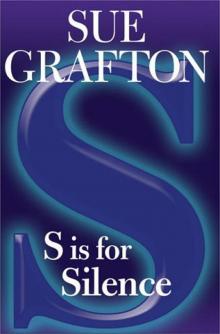 S Is for Silence
S Is for Silence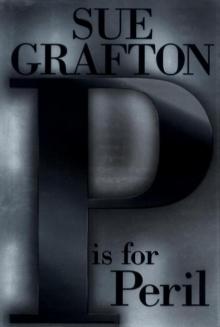 P Is for Peril
P Is for Peril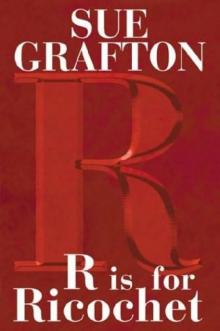 R Is for Ricochet
R Is for Ricochet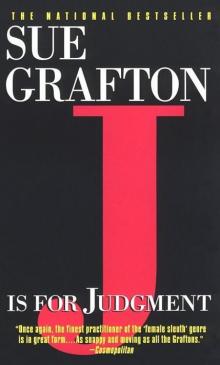 J Is for Judgment
J Is for Judgment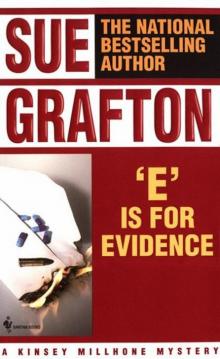 E Is for Evidence
E Is for Evidence T Is for Trespass
T Is for Trespass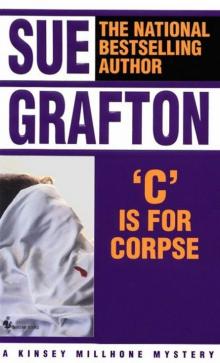 C Is for Corpse
C Is for Corpse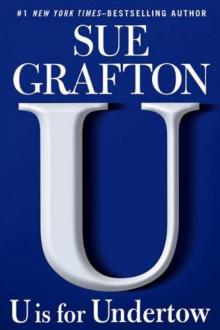 U Is for Undertow
U Is for Undertow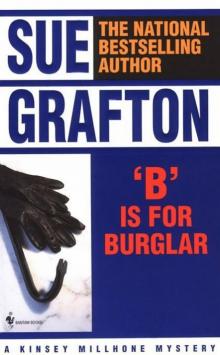 B Is for Burglar
B Is for Burglar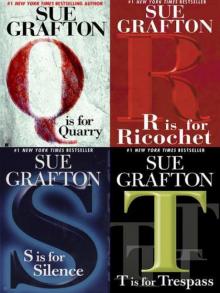 Four Sue Grafton Novels
Four Sue Grafton Novels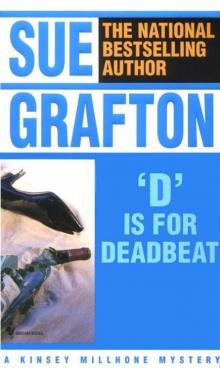 D Is for Deadbeat
D Is for Deadbeat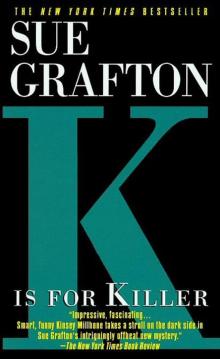 K Is for Killer
K Is for Killer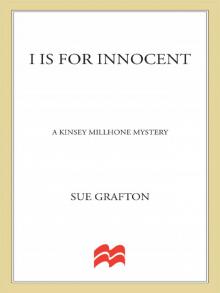 I Is for Innocent
I Is for Innocent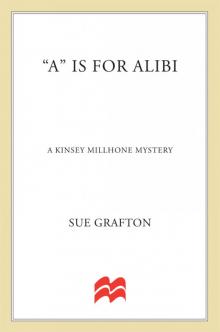 A Is for Alibi
A Is for Alibi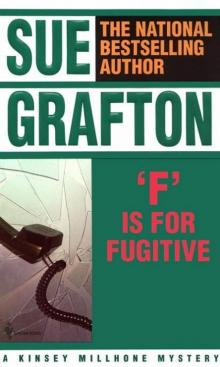 F Is for Fugitive
F Is for Fugitive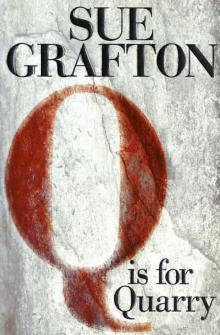 Q Is for Quarry
Q Is for Quarry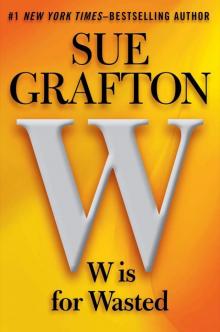 W Is for Wasted
W Is for Wasted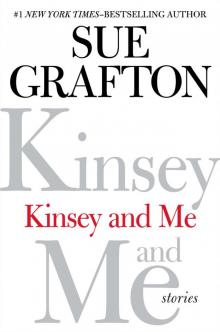 Kinsey and Me: Stories
Kinsey and Me: Stories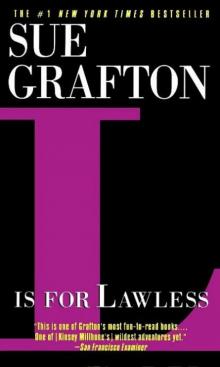 L Is for Lawless
L Is for Lawless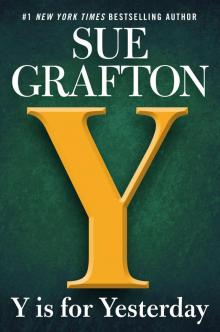 Y Is for Yesterday
Y Is for Yesterday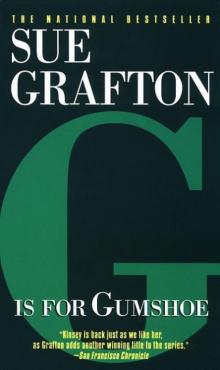 G Is for Gumshoe
G Is for Gumshoe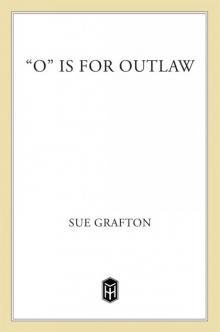 O Is for Outlaw
O Is for Outlaw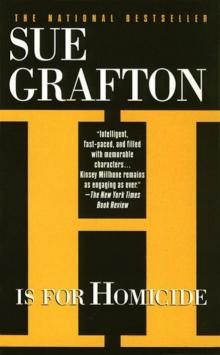 H Is for Homicide
H Is for Homicide X
X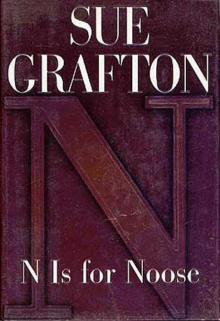 N Is for Noose
N Is for Noose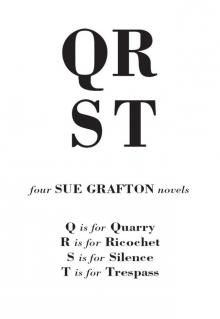 Three Complete Novels: A Is for Alibi / B Is for Burglar / C Is for Corpse
Three Complete Novels: A Is for Alibi / B Is for Burglar / C Is for Corpse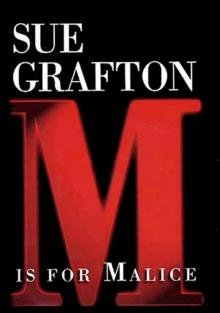 M Is for Malice
M Is for Malice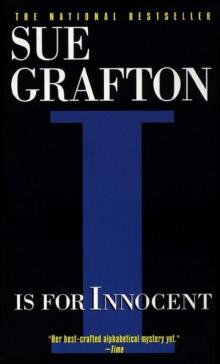 I is for INNOCENT
I is for INNOCENT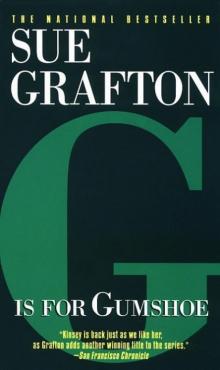 G is for GUMSHOE
G is for GUMSHOE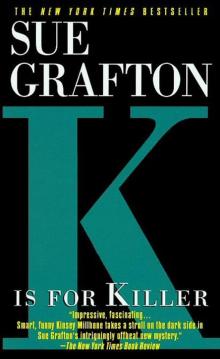 K is for KILLER
K is for KILLER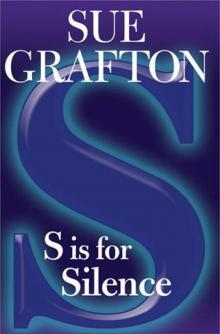 S is for SILENCE
S is for SILENCE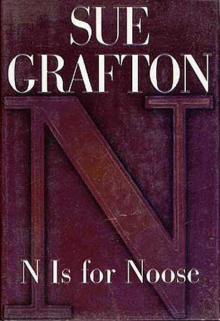 N is for NOOSE
N is for NOOSE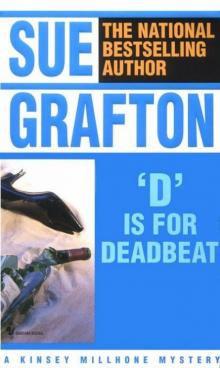 D is for DEADBEAT
D is for DEADBEAT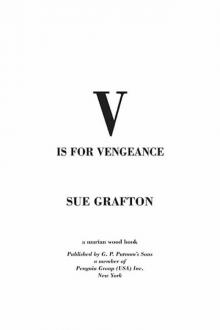 V is for Vengeance
V is for Vengeance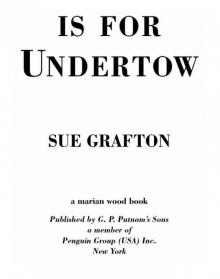 U is for Undertow
U is for Undertow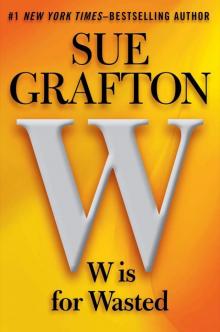 W Is for Wasted km-23
W Is for Wasted km-23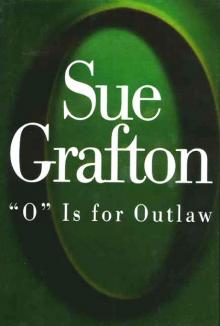 O is for OUTLAW
O is for OUTLAW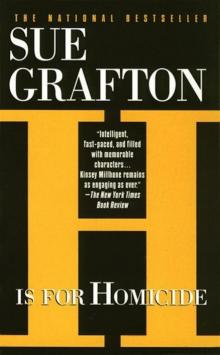 H is for HOMICIDE
H is for HOMICIDE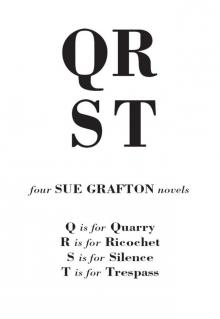 Sue Grafton Novel Collection
Sue Grafton Novel Collection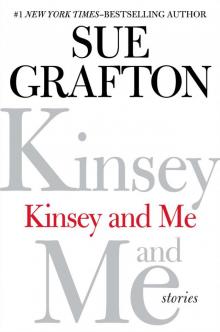 Kinsey and Me
Kinsey and Me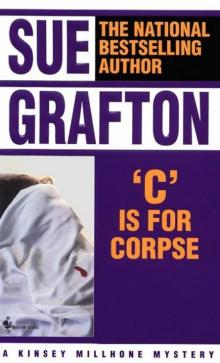 C is for CORPSE
C is for CORPSE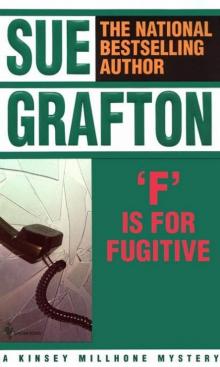 F is for FUGITIVE
F is for FUGITIVE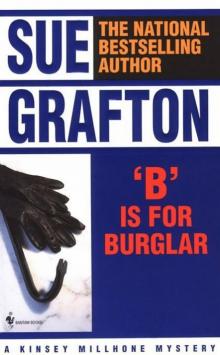 B is for BURGLAR
B is for BURGLAR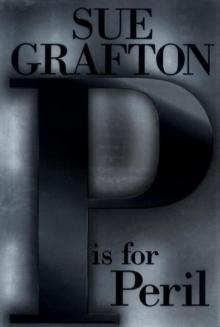 P is for PERIL
P is for PERIL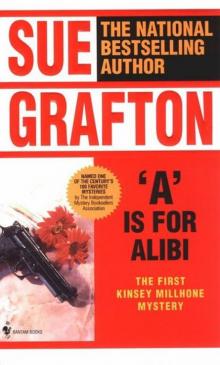 A is for ALIBI
A is for ALIBI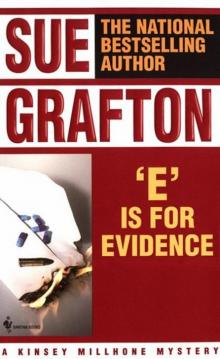 E is for EVIDENCE
E is for EVIDENCE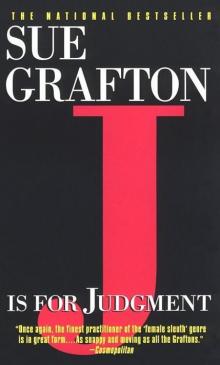 J is for JUDGMENT
J is for JUDGMENT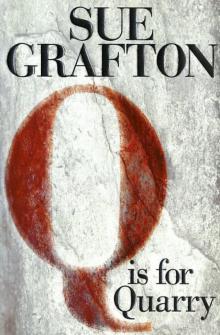 Q is for QUARRY
Q is for QUARRY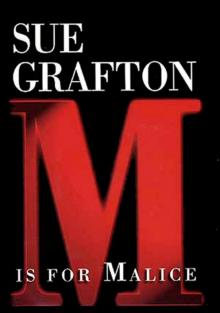 M is for MALICE
M is for MALICE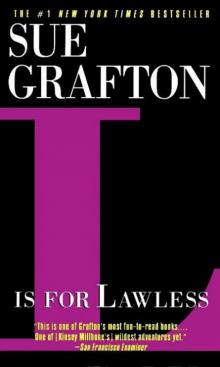 L is for LAWLESS
L is for LAWLESS